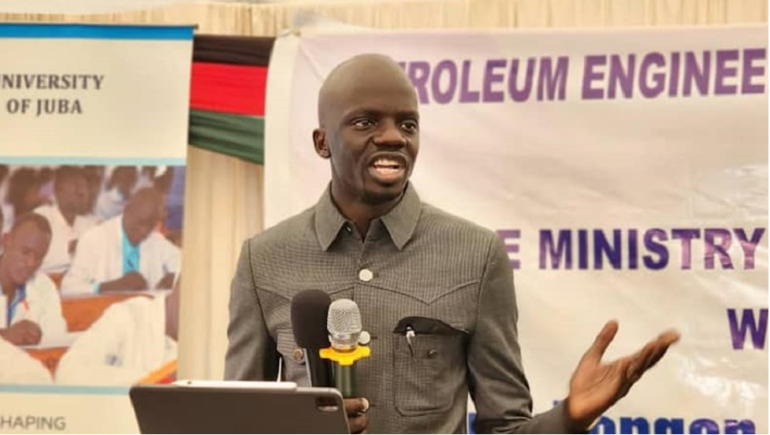By Kitab Unango
South Sudan’s Minister of Petroleum, Puot Kang Chol said Thursday that the production and transportation of crude to Port Sudan has not halted despite ongoing conflict in Sudan.
“I would like to reaffirm to the general public and to all concerned citizens of the Republic of South Sudan, that the current fighting in the Republic of Sudan has mildly affected the logistics and transportation of the critical materials and equipment through Port Sudan to our oilfields in the Republic of South Sudan,” Kang told a press conference in the South Sudan capital of Juba.
His remarks come in the aftermath of oil observers, warning that the oil infrastructure which Juba relies on to transport it’s crude could come under attack in the wake of conflict spreading to the Red Sea and Port Sudan.
“All our oilfields facilities such as the pipelines, pump stations, field processing, field service facilities and the Export Marine Terminal in the Republic of Sudan are well protected and safe from any damage,” Kang said.
The conflict in neighboring Sudan erupted Saturday last week, following disagreement between the head of the Sudan Armed Forces (SAF) Abdel Fattah Al-Burhan and Mohamed Hamdan Dagalo, leader of the paramilitary Rapid Support Forces (RSF) over the timeline for integrating the latter’s forces into the national army.
Kang said that current crude production stands at 169,149.81 barrels per day.
He, however conceded that the ongoing violence has disrupted logistical processes through Port Sudan, which may prompt them to consider alternative options if the situation persists.
“The Ministry of Petroleum with our investment partners, the Management and Technical Team of all the Joint Operating Companies namely, DPOC, GPOC and SPOC, and our counterparts in the Republic of Sudan have already set up an Emergency Response Plan (ERP),” he said.
“This team is being guided by a well-defined and structured contingency plan that will proactively mitigate the severity of the impact of the fighting in Sudan by re-routing all the logistics and transportation of all our critical materials, chemicals and equipment through other safer routes,” Kang disclosed.
Land locked South Sudan won independence from Sudan in 2011 following decades of conflict.
South Sudan upon seceding from Sudan went with 75 percent of oil resources, plunging it’s northern neighbor into economic crisis.














